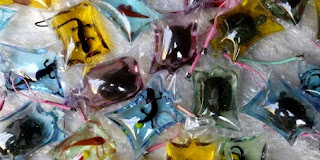Marine Pollution - Ocean Acidification
What is Ocean Acidification?
One of the major contributors to ocean pollution is ocean acidification. Ocean acidification is the rapid reduction of the pH levels in the Earth's oceans over a period of time.
Ocean acidification is caused by the ocean absorbing large amounts of carbon dioxide – almost 30 percent - in the atmosphere produced by the burning of fossil fuels and deforestation. As the amount of carbon dioxide increase, the pH level of the ocean decreases.
Oceans require a certain level of pH to maintain the natural biochemistry essential for a healthy ecosystem to remain unbroken for the different species living in the water.
Negative Impacts on Marine Animals
In areas where most life forms make up the majority of the ocean, the seawater is filled with calcium carbonate minerals essential for many marine organisms.
However, when ocean acidification occurs, corals and bivalves are negatively affected. As the acidic levels in the ocean rise, levels of carbonate decreases.
Bivalves such as mussels, oysters, clams, and scallops require calcium carbonate to build their shells and skeletons. The lower level of carbonate reduces the ability of these bivalves to produce and maintain their shells. It may also cause existing shells to weaken and dissolve, making them more vulnerable and increases their chances of being eaten.
Because bivalves are at the bottom of the food chain, once their numbers start decreasing, it will affect the entire food chain.
Corals will also be affected as they build their own homes from calcium carbonate to form complex reefs and also provide habitat for many marine organisms.
Ocean acidification may limit coral growth as the existing coral skeletons will be corroded and it will also slow the growth of new skeletons. This weakens the corals hence they will be more vulnerable to erosion.
Not only will ocean acidification affect corals and bivalves, but fishes will also suffer. Fishes and other forms of sea life will be contaminated, thus they are unable to be consumed by other animals in the sea, and humans as well. The continuing rise of acidic levels in the ocean may also cause reproductive disorders in fishes.
Negative Impacts on Humans
Human societies, which depends on goods and services provided by the ecosystems, will also suffer the consequences of the changes in marine ecosystems.
Many economies worldwide depend heavily on fishes and shellfish as a primary source of protein. If the number of these marine organisms continue to decline, the society could face significant revenue declines, leading to a loss of jobs and livelihoods.
Ways You Can Help
Eat less meat. Acres of forests are being cut down to make space for agriculture and farming. Livestock is responsible for producing more greenhouse gasses that all the forms of transport. To feed the livestock, large amounts of fertilizers, fuel, and pesticides are used. Animal waste also contributes to the increase in greenhouse gases as they release nitrogen and methane that pollutes the air.
Reduce the use of energy at home by making sure your home is well insulated, especially around the windows. Turn off lights and unplug power sources when not in use and use shorter cycles on your washing machine.
Lastly, you can also contribute to helping the economy by reducing the use of plastic. Instead of using or buying bottled water, bring your own reusable containers or water canteens.
Let us all do our part in helping the economy and the marine ecosystems by starting out with these simple steps.



Yes indeed! we just have to do our part, no matter how small or insignificant... Every effort counts!
ReplyDeleteI love your blogs that are so awakening and so much details it contains on each topic you write about!! Love reading your articles..
ReplyDeleteThis one is great too <3 Thanks for sharing <3
I really enjoy how you break your blogs down into small bits. How animals are affected, how that affects us, and how we can fix it. Great insights.
ReplyDeleteGreat insight. I hope every human share your passion to protect Mother Nature. It's disappointing to see the world rot away because of greed.
ReplyDeleteI wished everyone shared your passion to protect the earth, I loved this article. Thanks for sharing.
ReplyDeleteI can definitely agree that toxic waste and plastics are contributing to marine pollution and it's a shame that many still don't get the message on how destructive it is to our ecosystem.
ReplyDeleteElizabeth O